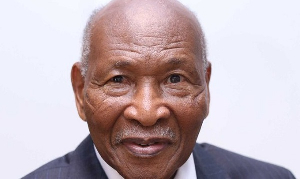Opinions of Sunday, 7 May 2023
Columnist: David Alemzero
Alemzero's thought on Ghana's economy quagmire
Ghana’s inflation has increased due to negative exogenous shocks and internal
misalignment of fiscal and monetary policy. Inflation, essentially, is changes in prices of goods and services. Ghana's main factors of inflation are fluctuations in the prices of goods and services and changes in energy prices. The shocks from the Ukraine-Russia war and Covid have disrupted global supply chains and manufacturing, which the economy is highly dependent on, leading to skyrocketing inflation rates in recent years.
When inflation began increasing in 2021, people thought it was transitionary, but the model below depicts that it is now persistent over the long term. This will persist until 2031; I depict this in figure one below. According to the Ghana Statistical Service (GSS), the monthly inflation rate for March was 45%., with food and alcohol beverages increasing to approximately 50.8%. From 2021, inflation increased by 75.3%.
This means that inflation will be around 38.5% in 2031, according to the forecast (Figure 1), under the current macroeconomic environment, unless drastic monetary and economic policies are in place to curb this trend. The current macroeconomic malaise has given me the basis for this forecast that inflation will be persistent to 2031, not transitionary due to current debt-to-GDP ratio of 84.6%, unbudgeted expenditures, to mention but a few. The panacea for Ghana out of this economic quagmire is that the government must limit its budget deficits, reduce unintended expenses and planned expenses in order to stay on its budgeted course.
These will collapse skyrocketing inflation amid low productivity, persistently missed inflation targets by the BOG and sweeping budget deficits intertwined with huge government debt.
In 2010, imports as percentage of GDP were approximately 55.10% and exports were
lagging at 42% of GDP. This is the reason for the runaway inflation rates we are seeing due to high demand for dollars and other major trading currencies for imports.
Furthermore, the services sector has overtaken a higher percent of GDP about 50.9% next to Agric of 27% in 2010, according to OpenDataAfrica.org. This is not sustainable. We need to improve the efficiency of the agricultural sector, which will reduce import levels, because as a developing country, the organic growth pattern is from industrialization to a services-based economy, not the
other way round. We have jumped the gun in our development path, hence our current economic
predicament. China organically went through this development pathway and is now transitioning to a service-based economy.
How can Ghana permanently get out of this economic doldrums?
As I have already alluded to in the preceding section, I will use the diagram below to proffer solutions, which the economic managers know but seem not to implement holistically.
Ghana needs to undertake fiscal consolidation and debt sustainability as recommended by Oliver Blanchard and other renowned economists for countries in such a situation as Ghana finds itself.
Now, it is obvious that this is not the worse period of inflation that the country is experiencing. The worst period of year-on-year inflation was from 1972 to 1983 for the fifty-year period of the forecast.
Recall that this period was the oil crisis similar to the current energy crisis, explaining the importance of energy as a headline inflation driver. Thus, it is important to consider the issue of energy security as a matter of national security concern. We need to develop our local renewable energy resources, such as solar, hydropower, wind energy, biogas, etc. These are local resources
that do not need to be imported. Furthermore, the costs of renewable energy are falling globally, making it cost competitive with fossil fuels. If we supply industries with cheap renewable energy or households generate electricity from solar PV, the cost of electricity bills for ordinary Ghanaians will be lower.
One can observe that there is a direction correlation among the three dynamic variables of inflation, exports, and imports. In that, even though imports as a percentage of GDP are still very high, when they are beginning to dip a little,
inflation begins to improve. At 2021, imports, as a percentage of GDP, were 28.5%, whereas export, as a percentage of GDP, were almost the same level of 29.90% of GDP. This does not encourage growth and economic development. This means that about 28% of our GDP comes from foreign countries, and one can understand the pressure on the Cedis as these importers exchange it for foreign currencies to import these goods and services, making the Cedis scare,
demand exceeding supply.
We need a structural transformation plan that will drastically change
the structure of the economy by focusing on import-substitution industries. The data does not lie, so we can only permanently move out of this place when we do this. China has done it and has become the industrial hub of the world. Ghana can do it, too. In fact, our first President Nkrumah started an industrial strategy by creating industries in each region, now almost all of them are
gone.
It is important to create a national industrial policy that puts the country on a pedestal on the global stage. This will be the basis for the restructuring. For example, China has developed a robust renewable energy supply chain that is heavily funded by the state. The idea of competitive advantage comes to play here. We need to invest in areas where it costs the least to produce goods from those areas, such as adding value to our natural resources, revolutionizing agriculture and so on.
All mining agreements with multinationals must provide for a percentage of
processing of the resources as part of the agreements to create jobs in the local economy and the national economy. Ghana has about thirteen major natural resources and if we processed only about 20% of those resources within the country, the economy would be much more developed.
Another means to restructuring the economy is to place a higher consumption tax on imported goods, which will force importation companies to relocate to Ghana to produce, and lower export taxes on some goods and services. The country should break down and simplify business registration processes and digitize public sector services, reducing the human interface that can limit corruption.
Some of these guidelines are in place, but they must be implemented to the letter. The key takeaway is that Ghana must ensure that we reduce importation as a percentage of GDP to the barest minimum and increase exports as a percentage of GDP to highest maximum, ensure debt sustainability.
All of these will bring about stabilization via a well-managed fiscal and monetary environment that will catapult the country to a more prosperous society for all.













